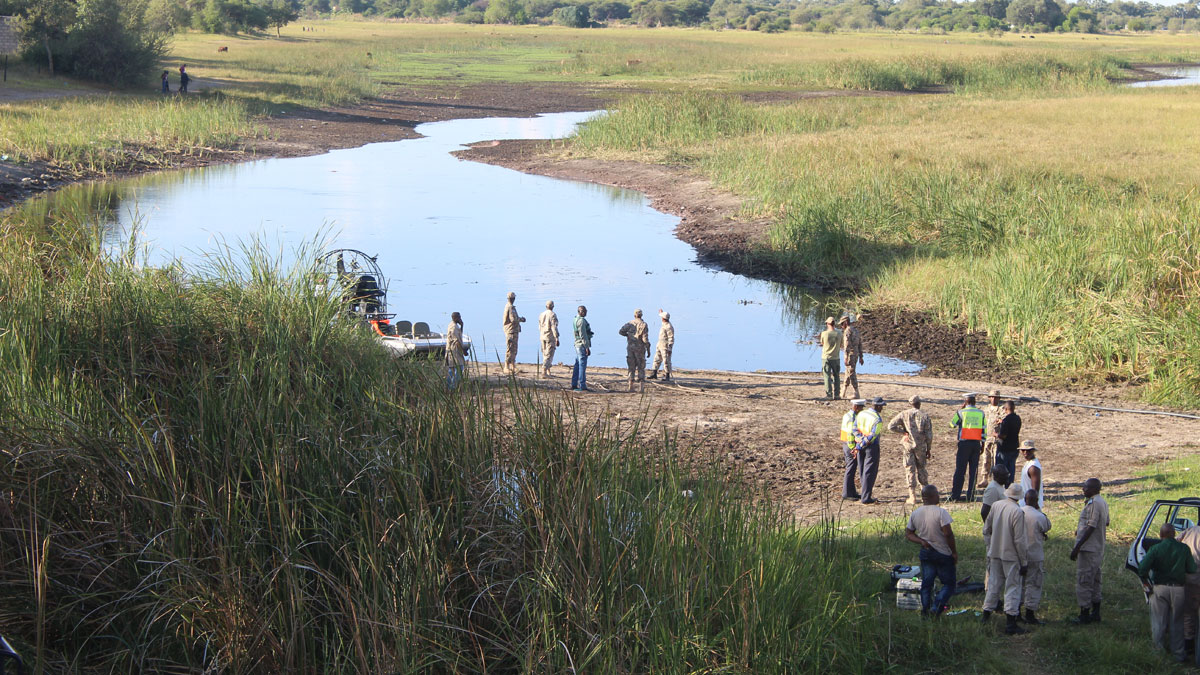Lying in a hospital bed with a broken arm, her body tender with bruises, 25-year-old Shirley Nthusang has a big smile on her face.
Despite her painful injuries, the Maun woman is just glad to be alive after coming face-to-face with an angry hippopotamus along the banks of the Thamalakane River shortly after sunrise last Friday morning.
Considering her arm briefly ended up in the hippo’s mouth, it is a minor miracle that Nthusang walked away in one piece.
Having lived to tell the tale, Nthusang does just that, speaking to The Voice from her hospital bedside in Letsholathebe Memorial Hospital, where she is recovering well.
She explains she was on her way to a relative’s funeral, leaving her home in Xhabara ward at around 6:30am, when the massive mammal attacked.
“It wasn’t that early and many people were walking along that path that connects Xhabara and Borolong wards. We had crossed the river, when we saw a hippo walking along the river bank, on the side we had just crossed from,” recalls Nthusang.
Minding its own business and walking in the opposite direction, the giant mammal seemed calm and unthreatened.
This all changed in a split-second
“Suddenly people started running, screaming that the hippo was rushing towards them. But being a woman I guess I couldn’t run faster. When I felt it was getting closer, I took a sharp turn. It ran past me but came to a quick halt a short distance away,” narrates Nthusang.
In grave danger, the young woman ran for dear life, twisting and turning to try and confuse the animal. But, in her haste to escape the beast, she tripped.
“When I hit the ground the hippo was already launching an attack, opening its big mouth and aiming for my head!”
Instinctively, she raised her arm to protect herself.
“It landed right in the animal’s mouth. I was very lucky because the arm was caught at the toothless spot, missing the sharp long teeth by a tiny margin,” continues Nthusang.
She was ultimately saved by the bravery of a few onlookers, who came to her rescue by making noise to scare the animal away, the hippo retreating into the overgrown riverbed thicket just as quickly as it struck.
“I was left with a broken arm, scratches on my breast and a very painful waist, I can’t even move at the moment,” ends Nthusang, closing her eyes as if to shut out the pain.
Meanwhile, as of Wednesday afternoon, Wildlife officers were still searching for the hippo.

Defending the lack of progress in locating an animal estimated to weigh around 2, 000kg, Acting Regional Wildlife Officer, Peletshweu Galebotswe explained the report reached her office late.
“It was between 0800hrs and 0900hrs. Immediately after receiving the report, a team of three men was sent out to search for the said hippo and remove it.”
Galebotswe confirmed the search was ongoing and advised residents to be extremely cautious when crossing the river.
Asked why her department has not issued a warning immediately after the incident, Galebotswe noted, “People have long been alerted of the dangers of crossing the river; the last spot announcement was in March after a similar incident happened. We request the public to be vigilant at all times and report all sightings of the hippo to wildlife, or nearest police, or kgotla.”
Additionally, Okavango Human Wildlife Conflict founding Director, Kenosi Kamina, whose Non-Governmental Organisation takes care of survivors of wild animal attacks, revealed they were yet to assess Nthusang’s condition.
“We paid her a visit in hospital, she is stable and what we advised her is to report the matter to the police. We cannot tell the extent of her injuries at the moment as she is still undergoing medical care, but our immediate assistance to her will be to offer counselling because she is still in trauma,” he said.
Despite their bulky size and seemingly docile nature, hippos are widely regarded as the world’s deadliest animal, responsible for at least 500 deaths in Africa every year.
They are known to be fast runners, hence their name, hippopotamus, meaning, river-horse in Greek. Scientists indicate that a hippo can actually run 30 kilometres per hour, while on average a person can run 10 km/h (females) and 13 km/h for males.







